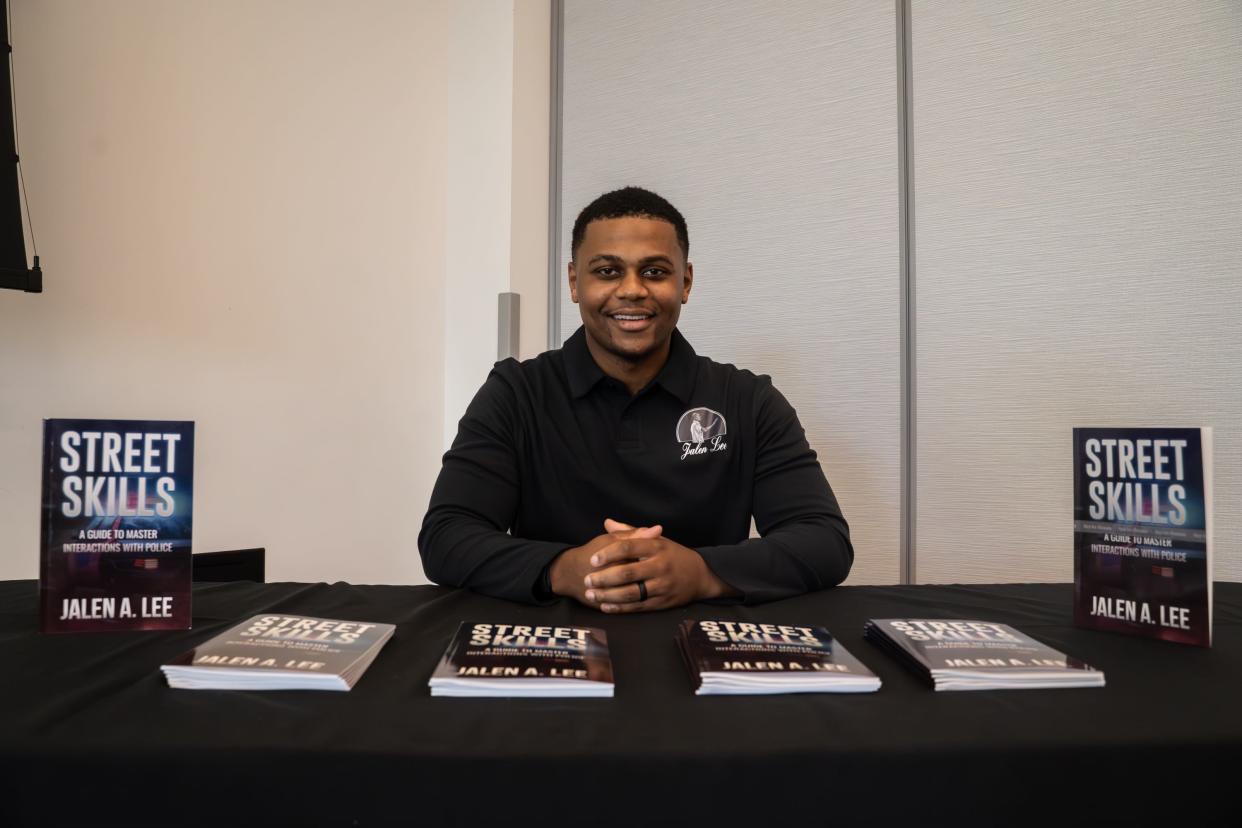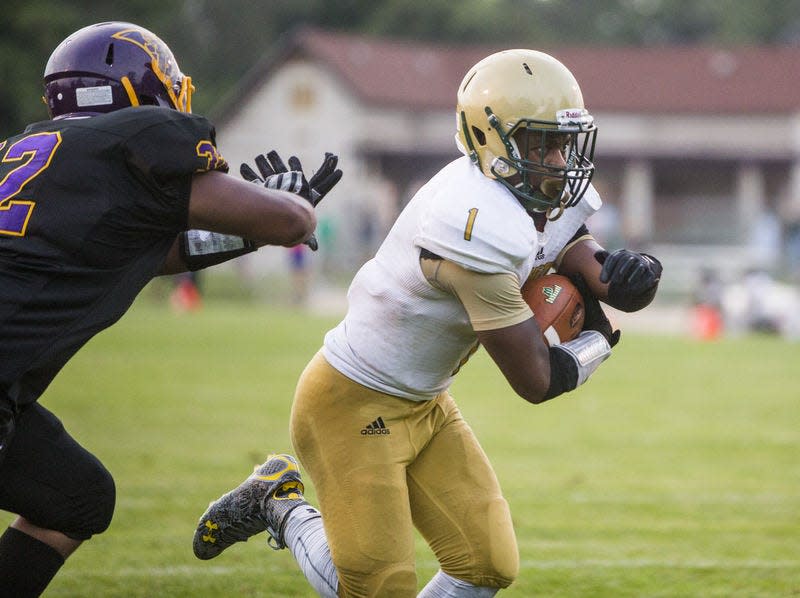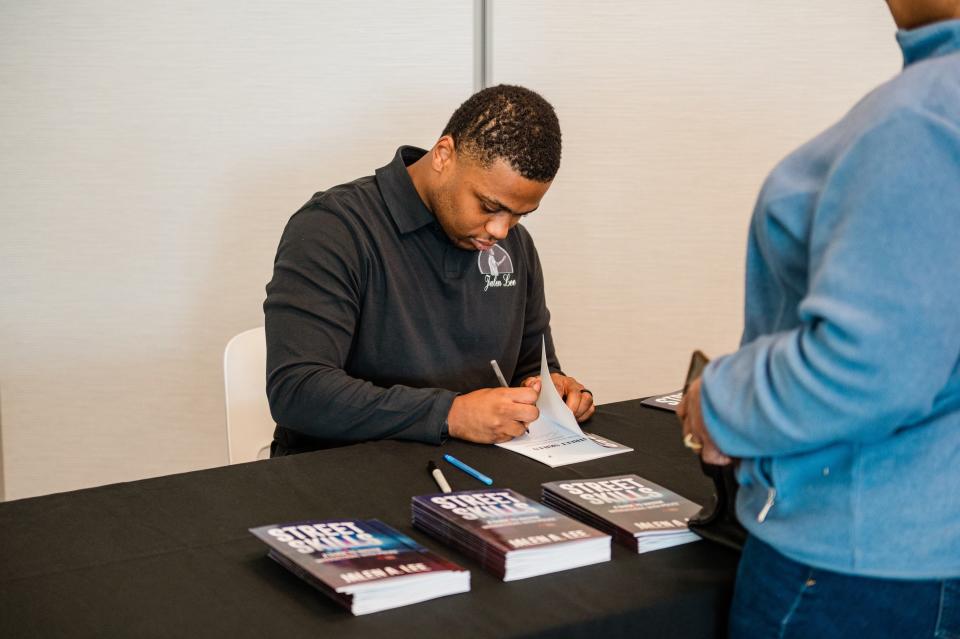School resource officer teaches students critical thinking skills for police interactions

SOUTH BEND — A decade ago, Jalen Lee played linebacker and running back for Washington High School's football team.
Now, he patrols his alma mater's halls as its School Resource Officer, which he has done for the past two years.
But he wants to be more than a cop to today's students: He wants to be a role model and teacher to them, just as Washington's SRO was to him when he was a Panther.
Lee, who attended Washington from 2012-2016, looks up to the past SROs as “giants with a magnitude and impact that can’t be measured,” he said.
“Washington High School has a long and rich history of School Resource Officers,” he said. “It’s a story that’s not really told. It’s my story.”
And he's put that story, from what he learned from the police officers he knew in his youth to what he learned during his first two years as a patrol officer with the South Bend Police Department, into his second book, “Street Skills: a guide to master interactions with the police.”
Specifically, Lee names Eric Crittendon, David Herron, Brian Kendall, Antown Jones, Tomar Thomas and Anthony Pearson as officers who all influenced him and helped shape his career trajectory. He met them working with the Police Athletic League as a student.
“If it wasn’t for my School Resource Officer,” Lee said, referring to Anthony Pearson, “I probably would have never become a police officer.”
Pearson remembers Lee as a bright young man who made his policing stronger. It was their interactions, Pearson said, that gave Lee an insight into what police do.
“School Resource Officers have the power to change student lives,” Pearson said. “I think this is unlike any other position as a police officer, because you’re strictly dealing with minds that are moldable.”
Pearson, who has been working with the SBPD for over 20 years and has been in the South Bend Community School Corporation since 2004, he estimated, working at Washington, Riley High School and, currently, Adams High School, has seen previous students, like Lee, now take their place in South Bend’s community as teachers, police officers and parents.
“Our conversations helped me be a better mentor because I had someone who was truly interested in what I did for a living,” Pearson said. “It was a no-brainer to jump on the train with him and push him forward to be doing even greater things that he’s doing now.”
From football to public speaking
Those “greater things” for Lee included attending Ball State University, where he played football as a slot receiver. However, Lee’s trajectory shifted when he was cut from the team his freshman year.
“After that, I had no idea what I wanted to do,” Lee said. “I had been an athlete my whole life, and at the time, that was a key to my identity.”

With football being “stripped away,” he had to find his next step. “What else do you do besides being a top athlete?” he asked.
Lee leaned into speaking, majoring in communications and keynote speaking and criminal justice. He wrote his first book while attending Ball State. During his junior and senior years, he averaged 150 speaking engagements, speaking in front of people and crafting easily digestible messages, he said.
“Being from around here, I never heard of anyone who was a professional speaker and who did it as their job. It was an amazing time,” he said, “It showed me what I wanted to do.”
Speaking engagements halted as the COVID-19 pandemic hit during Lee’s senior year. He had a full schedule of speaking engagements in 2020, but within a few weeks, they were canceled.
Lee came home.
“I utilized the second half of my degree and went into law enforcement,” he said.
Lee joined the South Bend Police Department in 2020, serving in the patrol division for his first two years.
After being on the streets and making a lot of arrests, he said, he began to question whether that was the right role for him within the department,
Incarcerations are a part of the job of being an officer, Lee said, but in the schools, there’s less of it.
“The goal of an SRO is not to arrest kids,” he said. “We exercise discretion as an educator. It’s about working with these kids as we educate them about the decisions they're making and the consequences that come with those decisions.”
In 2022, Lee decided to return to Washington, which had been without an SRO for two years, and serve in the school. To him, it felt right.
“This is my place,” he said. “This is where I’m from.”
A return to writing and speaking
Students brought new life to his creative side. They reinvigorated him, he said, and brought back the fire of speaking and writing, which led to his second book, “Street Skills: a guide to master interactions with the police,” released on Feb. 11.
“I see the need of the students, because they come to me with that need,” Lee said.
He provides scenario-based practices, based on his own experiences as an officer and questions he’s received from students he interacts with each day.

“My experience and the things that I see are mine,” he said.
The book takes the reader through five of the 10 amendments in the Bill of Rights: freedoms, petitions and assembly (Amendment 1), right to bear arms (Amendment 2), searches and arrests (Amendment 4), rights in criminal cases (Amendment 5), and right to a fair trial (Amendment 6).
The subtitle of the book, to master interactions with the police, Lee said, is so much more.
“There’s a lot our kids are dealing with,” he said.
Some schools might be dealing with fighting or underage alcohol abuse, Lee said, adding that the program can be shaped and molded per the needs of each school district.
In addition to his book, Lee wrote a workbook to educate students about the criminal justice system. Through his company, Jalen Lee & Associates, he does public speaking within schools.
He’s in negotiations with the South Bend Community School Corporation and Penn-Harris-Madison, he said, to provide his product and services to schools.
“Some schools are not equipped to teach these topics,” he said. “They have their standardized curriculum and a lot of these topics that we talk about don't really fall under the curriculum you need to graduate.”
For him, it’s important that students practice real life situations, so he provides a ratio of 30% content to 70% scenarios.
"The scenarios are the key," he said, "You can teach the content, but you have to make it real for students."
Scenario-based education
Lee said scenarios get students’ minds working and allow them to think more critically. This, he said, leads students to feeling more equipped.
“We want to focus on students’ decision making and leadership skills,” Lee said. “It’s not necessarily about teaching students what their rights are but how to apply them.”
From his past interactions on patrol, Lee said, he learned that “if anxiety doesn’t get them, fear will. If fear doesn’t get them, then they’re overthinking it. When you feel trapped, you can’t listen to what I’m telling you to do.”
He wants to pull students out of that frame of thinking by teaching them that they are allowed to think and respond to what’s happening.
“Most times, if you can critically think, you can get through most situations. I’ve been in some of the most hostile situations and some of the least hostile,” he said. “In all of those situations, what really separates those is your ability to think and process.”

Lee referenced his experience of pulling over a young African American male in a traffic stop in Chapter 5 of his book.
“After speaking with the young man, he explained that he had never been pulled over before and he was extremely nervous to the point he began to cry,” Lee wrote in “Street Skills.”
“He was literally shaking,” Lee said. “He paused me. This is not how our relationship is supposed to be.”
Lee said when an officer pulls over a car, they’re “in a position of dominance,” he said. “When I saw the emotions he was dealing with, I first asked myself, ‘What can I say to de-escalate him?’”
He asked the young man to step out of the car and explained that being stopped for a minor traffic offense "is not the end of the world," even though he understands why people might view it as such.
“I’m not here to get you, rough you up, mistreat you or talk down to you,” Lee said he told the scared driver that day. “That’s why I pulled you out of the car, because I wanted to talk to you on level ground, eye-to-eye.”
Lee said he took time to break down barriers between them.
“I knew at this moment," he wrote in "Street Skills," "I was given the power to change his reality and perception of the police. … I explained that the police are public servants at the core. We are here to serve, protect, and improve quality of life, not harass, abuse, or cause fear. I understand how we’ve gotten to this point where there’s an unhealthy fear toward police. I can’t change the history of the police and the public, but I can be intentional about how I treat the people I deal with daily to continually build the public’s trust in the police.”
“People view the police, sometimes, as this bigger-than-life person, or creature,” he said, “as a thing that’s ever-knowing or ever-powerful, but that’s not the reality. A lot of police interactions that we’ve seen in our society that have gone wrong, is because, most times, that police officer has human characteristics. Fear. Anxiety. Maybe, they didn’t make the best decision in a split second,” he said.
"Police are human,” Lee said but added that he doesn’t speak for anyone other than himself.
He recalled getting pulled over when he was 16 and 17 years old. “I’m not naïve to why,” Lee said. “I’m a kid who grew up here on the west side.”
However, contrary to the man he pulled over, Lee didn’t share the same perception of law enforcement.
“I knew police officers,” he said, referring again to the rich history of a police presence at Washington High School. “Anthony Pearson showed me that all police weren’t like that.”
In his interaction with the young man, Lee endeavored “to show him that all police aren’t bad.”
In his time with SBPD, working with everyone, he said, “It has nothing to do with skin tone. Good police officers come in all shapes, forms or sizes. There is no mold. It’s all based on who you are. What do you stand on? What are some of the morals and pillars that you lead your life with?”
Email Tribune staff writer Camille Sarabia at csarabia@gannett.com.
This article originally appeared on South Bend Tribune: Officer fills education gaps with scenario based criminal justice

